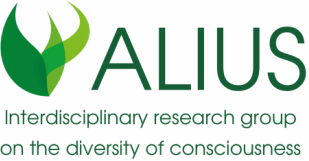|
|
Abstract: Depersonalization is characterized by fundamental alterations to the sense of self, including feelings of detachment and estrangement from one's body. We conducted an online study involving healthy participants (n = 514) with depersonalization traits to investigate the subjective experience of body and self during waking and dreaming, as most previous studies have focused primarily on waking experiences. Exploring dreams in individuals experiencing depersonalization symptoms may help us understand whether the dream state offers a 'spared space' where people can temporarily 'retrieve' their sense of self and bodily presence. Our findings indicate that higher depersonalization traits, measured by the Cambridge Depersonalization Scale, are associated with more frequent dream experiences from an outside observer perspective, distinct bodily sensations, altered bodily perception, and nightmares, as well as higher dream recall. Additionally, higher scores on the Cambridge Depersonalization Scale were linked to lower body boundary scores in waking states and a reduced degree of trust in interoceptive signals. This study provides insight into the complex phenomenology of depersonalization concerning bodily selfhood during waking and dreaming, suggesting potential avenues for therapeutic interventions for individuals with chronic depersonalization, known as depersonalization-derealization disorder. Matt Gwyther holds a Masters in Cognitive & Clinical Neuroscience from Anglia Ruskin University (ARU) and has primarily worked as a Research Assistant on a Bial Foundation project titled *Living in a Dream: Body and self-experience during waking and dream states in depersonalisation*. As a Visiting Research Fellow at ARU, he explores altered states of consciousness through collaborations on Floatation-REST and AI/VR public engagement experiments. He has lectured on AI fundamentals, hosted exhibitions at the Cambridge Festival, and co-produced an ebook about the lived experience of Depersonalisation. Matt also manages digital strategy at Cambridge University Press & Assessment, collaborates with Floatwell in the wellness sector, and co-founded Ripplty, an initiative to explore creativity and meaning. Dr. Anna Ciaunica is a Principal Investigator at the Centre for Philosophy of Science, University of Lisbon, and a Research Associate at the Institute of Cognitive Neuroscience, University College London. She leads interdisciplinary projects exploring self-consciousness, embodiment, and social interactions in humans and artificial agents, using tools from psychology, neuroscience, Virtual Reality, and robotics. Anna has advanced the concept of minimal selfhood as a process of co-embodiment and co-homeostasis, emphasizing its development from the womb throughout life. She also coordinates the Network for Embodied Consciousness, Technology and the Arts (NECTArs), fostering collaboration on self-consciousness and embodiment in our digital world. |

